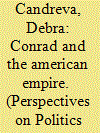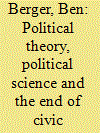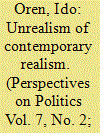|
|
|
Sort Order |
|
|
|
Items / Page
|
|
|
|
|
|
|
| Srl | Item |
| 1 |
ID:
090676


|
|
|
|
|
| Publication |
2009.
|
| Summary/Abstract |
Joseph Conrad offers some of the most notoriously contested writing on imperialism in nineteenth-century literature. In this article, I use two of his stories ("An Outpost of Progress" and Heart of Darkness) to argue that his critique of imperialism is as relevant today as it was in his own time.
Conrad's critique of imperialism is twofold. First and most simply, he condemns it as an economically exploitative endeavor. Second, and more importantly, he rejects the "idealistic" claim often invoked to justify imperialism as the bearer of progress, enlightenment, and other supposedly universal liberal values. This second critique causes Conrad the most difficulty, largely because his rejection of idealism is only partial. I argue that the most controversial aspects of his work are manifestations of a philosophical struggle between universalistic idealism on the one hand, and relativistic skepticism on the other. In this, Conrad contends with a problem that historically has challenged both liberalism and its conservative critics alike. Moreover, it continues to challenge both perspectives today, particularly in the debate over so-called American imperialism.
|
|
|
|
|
|
|
|
|
|
|
|
|
|
|
|
| 2 |
ID:
090677


|
|
|
|
|
| Publication |
2009.
|
| Summary/Abstract |
Within a span of fifteen years civic engagement has become a cottage industry in political science and political theory, but the term has now outlived its usefulness and exemplifies Giovanni Sartori's worry about conceptual "stretching." This article traces civic engagement's ascension as a catch-all term for almost anything that citizens might happen to do together or alone, and illustrates the confusion that its popularity has occasioned. It proposes that civic engagement meet a well-deserved end, to be replaced with a more nuanced and descriptive set of engagements: political, social, and moral. It also examines the appeal of engagement itself, a term that entails both attention and energy. Attention and energy are the mainsprings of politics and most other challenging human endeavors. But they can be invested politically, or in associative pursuits, or in moral reasoning and follow-through, and those types of engagement can, but need not, coincide. We should be asking which kinds of engagement-which kinds of attention and energetic activity-make democracy work, and how they might be measured and promoted.
|
|
|
|
|
|
|
|
|
|
|
|
|
|
|
|
| 3 |
ID:
090675


|
|
|
|
|
| Publication |
2009.
|
| Summary/Abstract |
What are social science theorists' responsibilities for the effects of their theories in the real world? I maintain that politicians and ideologues place theories in their political agendas without necessarily heeding their actual content. Hence, the ramifications of theories in the real world are mostly the result of political uses and, at times, political abuses. Consequently, theorists cannot be held morally responsible for these. They do, however, bear the obligation to examine if there are some intrinsic features of theorization and theory that render these susceptible to public misinterpretation and vulnerable to political abuse. Pointing to the rhetorical capital inherent in theories, and supported by examples involving democratic-peace theory and its political destinies, I conclude that, to discharge this task, social science theorists should substitute the prevailing objective ethic with a normative one.
|
|
|
|
|
|
|
|
|
|
|
|
|
|
|
|
| 4 |
ID:
090674


|
|
|
|
|
| Publication |
2009.
|
| Summary/Abstract |
Realist International Relations thinkers often intervene in political debates and criticize their governments' policies even as they pride themselves on theorizing politics as it "really" is. They rarely reflect on the following contradictions between their theory and their practice: if there is a "real world" impervious to political thought, why bother to try to influence it? And, is realist theory not putatively disconfirmed by the fact that realist thinkers have so often opposed existing foreign policies (e.g., the wars in Vietnam and Iraq)? I argue that these contradictions are not inherent in realism per se so much as in the commitment of contemporary realists to naturalistic methodological and epistemological postulates. I show that Hans Morgenthau and especially E. H. Carr, far from being naïve "traditionalists," have grappled with these questions in a sophisticated manner; they have adopted non-naturalistic methodological and epistemological stances that minimize the tension between realist theory and the realities of realists' public activism. I conclude with a call for contemporary realists to adjust their theory to their practice by trading the dualism underlying their approach-subject-object; science-politics; purpose-analysis-for E. H. Carr's dictum that "political thought is itself a form of political action."
|
|
|
|
|
|
|
|
|
|
|
|
|
|
|
|
|
|
|
|
|